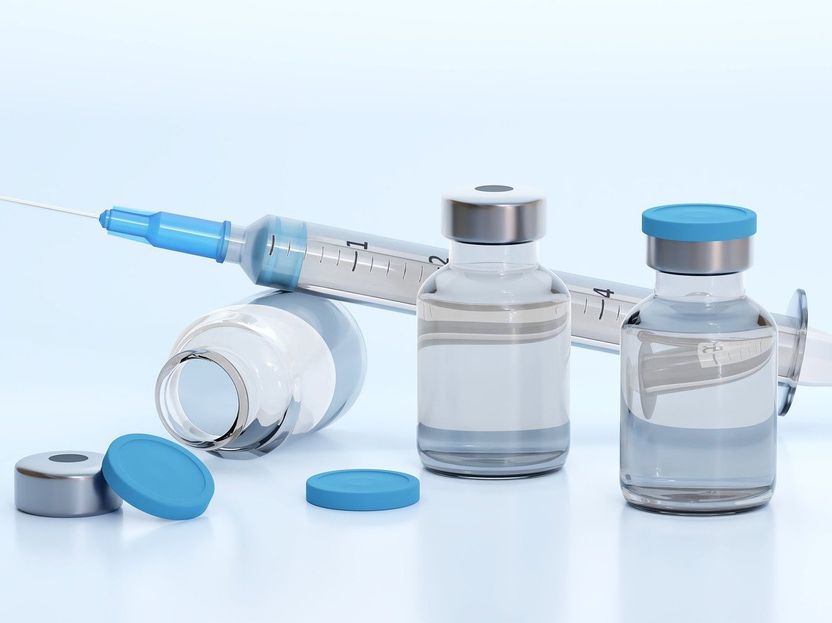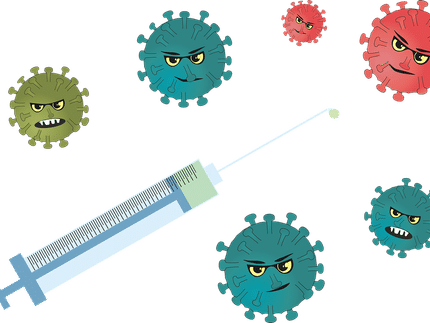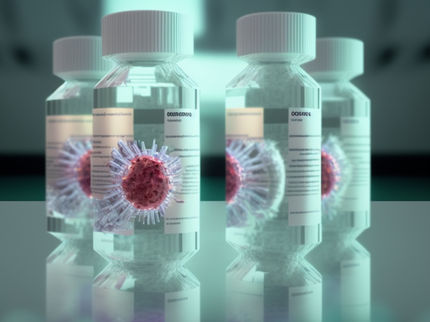Comparison of Vaccine Adjuvants
Notable Differences in their Effect and Potency in Vaccines
So-called adjuvants, which boost the effect of vaccines, act by stimulating the innate and acquired immune system. A research group led by Paul-Ehrlich-Institut and Friedrich-Loeffler-Institut has established a model system with cultured human immune cells to analyse the varied influence that different adjuvants can have on such cells. The findings could be useful for assesing adjuvants in the context of vaccine development and regulation.

Symbolic image
pixabay.com
Adjuvants are components of many inactivated and subunit vaccines. They are used to enhance the immune response to vaccine antigens. Antigens are molecular structures of pathogens that are recognised by the immune system. Upon recognition different effector mechanisms of the immune system, e.g. neutralising antibodies or cytotoxic T cells, neutralise or destroy the pathogen and thus confer protection against the corresponding infectious disease.
With live vaccines like the measles-mumps-rubella (MMR) combination there is no need for adjuvants because the intrinsic immunogenicity of the attenuated infectious agents is sufficient to induce protective immune responses. Inactivated or subunit vaccine antigens are usually less immunogenic. This lack of intrinsic immunogenicity can be compensated by the addition of immune enhancing adjuvants. The development of safe and potent adjuvants is an evolving field. In recent years several innovative adjuvants have been tested in clinical trials or are already been used in authorised vaccines.
To gain further information on the safety and efficacy of adjuvants, a team of scientists under Dr Laura Rossmann and Professor Ger van Zandbergen, head of the immunology department at Paul-Ehrlich-Institut and university professor at Mainz University Teaching Hospital, together with Dr. Max Bastian of the Friedrich-Loeffler-Institut, and researchers at Institut Pasteur in France and Korea, investigated and compared various classes of adjuvants.
The team set up an in-vitro system using human immune cells, which had previously been isolated from peripheral blood of human volunteers, and investigated the effect of ten different compounds, representing different classes of adjuvants, on cells of the innate and the adaptive immune system.
Many adjuvants target dendritic cells (DCs) - key players orchestrating the induction of adaptive immune responses. The team specifically investigated the response of isolated DCs and of DCs co-cultivated with different types of lymphocytes (white blood cells: B, T and NK cells). This co-cultivation mimics the situation in the lymphnode, where dendritic cells present cognate antigens to the corresponding lymphocytes. The change in the activity and functionality of the immune cells was assessed in the presence or absence of the various adjuvant compounds.
The adjuvants stimulated the immune cells to varying degrees and thus exhibited individual effect profiles. Some adjuvants stimulated the dendritic cells directly, while others showed enhanced activity when lymphocytes were involved. Some showed almost no effect on dendritic cells. Some adjuvants –- although targeting the same immune receptor, i.e. the Toll-like receptors (TLR) TLR4, TLR7 and TLR8 – provoked different cellular responses in terms of cytokine or chemokine-release.
Interestingly, there was a striking stimulation of CD4- and CD8-positive T cells and of antibody-producing B cells with TLR7- and TLR7/8-binding adjuvants. It is known that mRNA, which is currently used as vaccine platform against COVID-19, can activate TLR7 and TLR8 receptors. In the present study, single-stranded lipid-complexed RNA showed a strong immunomodulatory effect with a pattern very similar to that of other TLR7/TLR8-binding adjuvant used throughout the project.
"Our research yielded important findings that we can use for reliable assessment of the immunomodulatory properties of adjuvants. The parameters we applied can serve to define and control further criteria for the efficacy and safety of adjuvants. This can be very helpful in the development of vaccines and its regulation," says Professor Ger van Zandbergen, explaining the significance of the current research.
Original publication
Rossmann L, Bagola K, Stephen T, Gerards AL, Walber B, Ullrich A, Schülke S, Kamp C, Spreitzer I, Hasan M, David-Watine B, Shorte S, Bastian M, van Zandbergen G; "Distinct single component adjuvants steer 1 human DC-mediated T cell polarization via Toll-like receptor signaling towards a potent antiviral immune response"; Proc Natl Acad Sci U S A Sep xx [Epub ahead of print].



















































